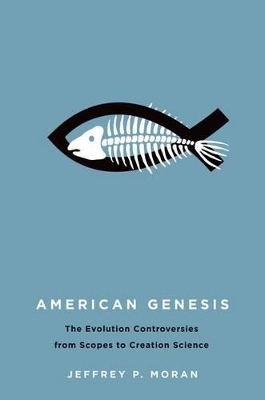
American Genesis
The Evolution Controversies from Scopes to Creation Science
Seiten
2012
Oxford University Press Inc (Verlag)
978-0-19-518349-8 (ISBN)
Oxford University Press Inc (Verlag)
978-0-19-518349-8 (ISBN)
In American Genesis, Jeffrey P. Moran offers a novel cultural and social history of the ways in which antievolution struggles have reverberated beyond the confines of legislatures and courthouses to touch upon race, region, religion, gender, and identity from the early twentieth century to the present.
Teaching evolution in the public schools has been a perennial problem in America. From the courthouse in Dayton, Tennessee, in 1925, to modern fights over "intelligent design" and creation science, evolution and its critics have battled over the role of science and religion in American public life.
But the antievolution controversies are not merely political problems. In American Genesis, Jeffrey P. Moran explores the ways in which the evolution struggles also have reverberated beyond the confines of legislatures and courthouses. In addition to offering a careful analysis of antievolutionism's ideological and strategic development, this wide-ranging social history argues that evolution's reception has been shaped by four peculiarly American forces: a diverse population, regional divisions, a sometimes shaky Protestant dominance, and a tradition of democratic populism. In each area, the battles over evolution exposed and polarized existing divisions.
Using extensive research in newspapers, periodicals, and archives, Moran investigates the critical influence that gender ideals have had in antievolutionism, as well as the complex role women play in modern controversies. Similarly, he analyzes the unexamined relationship between African Americans and antievolution. Moran's reading of regional differences explains how fundamentalism, a movement born in the North, came to flourish primarily in the South.
Throughout the nation, Moran argues, antievolutionist ideology has retained strong continuities from its roots in the early twentieth century, despite its modern packaging as creation science or Intelligent Design. Finally, Moran balances scholars' understandable focus on the unfamiliar territory of antievolutionism by considering the self-conceptions and preconceptions of modern scientists as activists, teachers, and bystanders in the struggle.
Teaching evolution in the public schools has been a perennial problem in America. From the courthouse in Dayton, Tennessee, in 1925, to modern fights over "intelligent design" and creation science, evolution and its critics have battled over the role of science and religion in American public life.
But the antievolution controversies are not merely political problems. In American Genesis, Jeffrey P. Moran explores the ways in which the evolution struggles also have reverberated beyond the confines of legislatures and courthouses. In addition to offering a careful analysis of antievolutionism's ideological and strategic development, this wide-ranging social history argues that evolution's reception has been shaped by four peculiarly American forces: a diverse population, regional divisions, a sometimes shaky Protestant dominance, and a tradition of democratic populism. In each area, the battles over evolution exposed and polarized existing divisions.
Using extensive research in newspapers, periodicals, and archives, Moran investigates the critical influence that gender ideals have had in antievolutionism, as well as the complex role women play in modern controversies. Similarly, he analyzes the unexamined relationship between African Americans and antievolution. Moran's reading of regional differences explains how fundamentalism, a movement born in the North, came to flourish primarily in the South.
Throughout the nation, Moran argues, antievolutionist ideology has retained strong continuities from its roots in the early twentieth century, despite its modern packaging as creation science or Intelligent Design. Finally, Moran balances scholars' understandable focus on the unfamiliar territory of antievolutionism by considering the self-conceptions and preconceptions of modern scientists as activists, teachers, and bystanders in the struggle.
Associate Professor of History, University of Kansas. Author of Teaching Sex: The Shaping of Adolescence in the 20th Century (Harvard, 2000) and editor of The Scopes Trial: A Brief History with Documents (New York: Bedford Books, 2002).
Acknowledgments ; Preface ; Introduction: Darwin Comes to America ; Chapter One: Monkeys and Mothers ; Chapter Two: Regionalism and the Antievolution Impulse ; Chapter Three: Fighting for the Future of the Race ; Chapter Four: Descent with Modification ; Chapter Five: Creationism and the Campus ; Notes ; Index
| Zusatzinfo | 13 halftones |
|---|---|
| Verlagsort | New York |
| Sprache | englisch |
| Maße | 236 x 157 mm |
| Gewicht | 408 g |
| Themenwelt | Geschichte ► Allgemeine Geschichte ► Neuzeit (bis 1918) |
| Geisteswissenschaften ► Geschichte ► Regional- / Ländergeschichte | |
| Geschichte ► Teilgebiete der Geschichte ► Kulturgeschichte | |
| Geisteswissenschaften ► Religion / Theologie | |
| Naturwissenschaften ► Biologie ► Evolution | |
| ISBN-10 | 0-19-518349-5 / 0195183495 |
| ISBN-13 | 978-0-19-518349-8 / 9780195183498 |
| Zustand | Neuware |
| Haben Sie eine Frage zum Produkt? |
Mehr entdecken
aus dem Bereich
aus dem Bereich
Europa 1848/49 und der Kampf für eine neue Welt
Buch | Hardcover (2023)
DVA (Verlag)
CHF 67,20
Giordano Bruno - ein ketzerisches Leben
Buch | Hardcover (2024)
C.H.Beck (Verlag)
CHF 41,85


